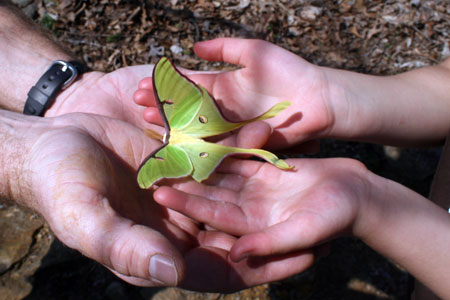Today’s word of the day is jug-handled, meaning “one-sided,” as in, “I think that courtesy, like reciprocity, should not be jug-handled.”
Today’s word of the day is jug-handled, meaning “one-sided,” as in, “I think that courtesy, like reciprocity, should not be jug-handled.”
An uncommon meaning of daylight makes it today’s word of the day. Daylight is a way of saying “the space between two things,” such as in automobile racing. It’s also the space left in a wine glass between the liquor and the brim. There was a time, when people drank bumpers—a bumper being a cup or glass brimming with alcohol (and related, of course, to bumper crop)— that the toastmaster would call out, “Are the glasses full? —no daylights—no heeltaps—tops and bottoms—not so much as would blind a midge’s eye is to be left.” In other words, he wanted to make sure the glasses were topped off and that every drop was downed to show that the attendees wholeheartedly endorsed the toasts.
If you’d like to suggest a word of the day, email us at wotd@wordnik.com.
Today’s word of the day is sawder, used especially in the phrase soft sawder to mean “blarney” or “nonsense.” It is a pronunciation-spelling of solder, which is a meltable, malleable metal alloy which is heated used to join metallic parts, such as in electronic gear. If you have a soft solder, then you likely have a badly made circuit or seam. In Willis the Pilot: A Sequel to the Swiss Family Robinson (1858), Paul Adrien uses it this way: “A Frenchman I once met […] firmly believed the Yankees lived on a soup made of bunkum and soft-sawder.” A synonym is soft soap.
Today’s word of the day is luna moth, which is described by The Century Dictionary as “the most beautiful of North American insects, of a light-green color relieved by luniform eye-spots and by a broad purplish-brown or liliaceous anterior border.” There are many photos of this beautiful insect on the entry’s Flickr page. The caterpillar is kind of amazing, too, though you need to be sure that’s what you have!

Today’s word of the day is pluck. Naturally, if we’re going to choose a word that seems so ordinary, we’re going to tell you about a meaning that isn’t. This pluck is the heart, liver, windpipe, and lungs of a sheep, ox, or other animal used as butchers’ meat. It’s also used figuratively or humorously for similar parts of a human being, especially when talking about “having the pluck” or “being plucky,” meaning, “showing courage and spirit in trying circumstances” or “being bold or brave.” In other words, “having the guts or the stomach to do something” or “showing intestinal fortitude.”
Why doesn’t anyone ever say, “He has the belly button to do what’s right?”
Today’s word of the day is sumph, a Scots and English dialect word meaning “dunce or blockhead.” Such a person is sumphish and practices sumphishness. Other lesser-known terms meaning “dunce or blockhead” are boodle, cabbage-head, clodpoll, dizzard, duncepoll, funge, gaby, goff, gomerel, grouthead, groutnoll, leatherhead, loggerhead, niddy, and pigsconce.
![]() NE of our favorite parts of Wordnik is the Century Dictionary. With more than 530,000 definitions and discursive notes, it is the second-largest English-language dictionary ever published.
NE of our favorite parts of Wordnik is the Century Dictionary. With more than 530,000 definitions and discursive notes, it is the second-largest English-language dictionary ever published.
But the Century isn’t just big—it’s beautiful, too. To quote expert etymologist Anatoly Liberman, “The Century is one of the great reference works in American history (some would say the greatest).” In the Oxford History of English Lexicography, Thomas Herbst and Michael Klotz write that “it is a superb dictionary in many respects and still has much to offer to those interested in the vocabulary of the period. It was from the beginning a quixotic venture (as many new dictionaries are), and it occupies a singular place in American lexicography for its attempt to marry the highest form of the printers art with dictionary-making.”
The Century—despite having been available online as searchable images from the nice folks at Global Language, and in scanned and OCR (optical character recognition) versions at the Internet Archive and through Google Books—has been too little-known for too long. So we knew we wanted it to be a part of Wordnik in a format that was a little less archival and a little more useful, to give more people the joy of browsing through it.
We didn’t want to change the spirit of the original text, but we did want to make the Century a bit more readable. So we expanded thousands of abbreviations (such as mycol., priv., and Lett.) to their full forms (mycology, privative, and Lettish, in case you were curious). We also converted more than 240,000 pronunciations from the obsolete Century format (they had about a dozen different representations for schwa [ə]!) to the International Phonetic Alphabet.
Even though we had the entire Century keyed from scanned pages, instead of using OCR (for better accuracy) there are still some typos scattered through the text. If you see a typo in any entry, please do use the “Report a typo” link at the top of the page to let us know!
Other usability improvements are coming soon, but in the meantime, if you’d like more information about the Century Dictionary, see the Wikipedia entry. Also, in the 1996 (number 17) issue of the journal Dictionaries, published by the Dictionary Society of North America, there are a number of excellent articles celebrating the centennial of the first edition of the Century.
